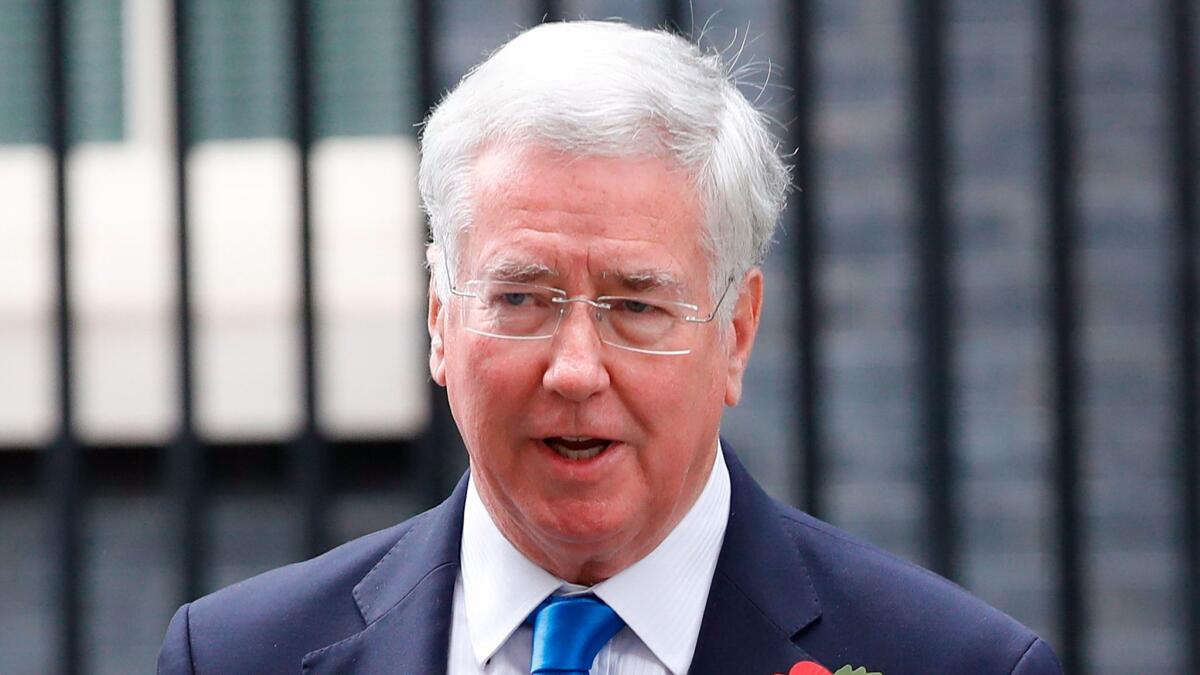British Prime Minister Theresa May’s troubled government struggles with inappropriate conduct, resignations

British Prime Minister Theresa May has repeatedly promised to deliver strong and stable leadership, but for many observers her troubled government increasingly appears overwhelmed by mistakes and inappropriate conduct.
During the last couple of weeks, May has dealt with the resignations of two high-profile Cabinet colleagues, diplomatic tensions with Iran sparked by her gaffe-prone foreign secretary and a sexual harassment scandal involving some of the nation’s top politicians.
Then, on Friday, the sixth round of negotiations over Britain’s pending withdrawal from the European Union showed signs of faltering once again.
Michel Barnier, the European Union’s chief Brexit negotiator, warned the British government that if it failed to provide vital clarity within two weeks on the financial settlement it was willing to provide the EU in exchange for exiting, negotiations about what any future trading deal would look like could not move forward.
Britain has hinted at about $24 billion as an exit fee, while EU officials have estimated $70 billion or more.
Even by standards of recent British politics, which have been anything but predictable, it has been a disastrous series of crises for the Conservative government that raises fresh doubts about May’s ability to govern and her party’s chances of delivering Brexit successfully.

“I think we’ve come to the point where she can’t afford too many more crises like this. It’s beginning to look like she’s losing her grip,” said politics professor Tim Bale of Queen Mary University of London. “Every time she seems to get a handle on the situation, another crisis emerges. It smacks of a prime minister who is on her way out.”
May’s defense secretary, Michael Fallon, resigned last week amid a sexual harassment scandal that has engulfed Westminster and implicated dozens of politicians from all parties.
Fallon, who has been accused of repeatedly touching a reporter’s knee in 2002, stepped down after admitting that his conduct did not live up to the high standard expected of him.
While May looked for Fallon’s replacement, International Development Secretary Priti Patel came under fire this week for holding unauthorized meetings with Israeli officials, including Prime Minister Benjamin Netanyahu, during a family vacation in August.
Patel was summoned back to Westminster from a visit to Africa on Wednesday and resigned after acknowledging her actions “lacked transparency.”
As if dealing with two Cabinet resignations was not enough, Foreign Secretary Boris Johnson also became embroiled in a scandal after he told a government committee that a British Iranian woman serving a five-year sentence in an Iranian prison for allegedly plotting to topple the Tehran government had been training journalists in Iran.
Nazanin Zaghari-Ratcliffe, who worked for the Thomson Reuters Foundation, insists she was visiting family, but Johnson’s comments were cited as evidence against her in court. It has sparked calls for Johnson’s resignation and outrage from Zaghari-Ratcliffe’s family and legal team, who have been battling to prove her innocence.
“This has a drip-drip effect,” said Anand Menon, professor of European politics at King’s College London. “You get a whiff of incompetence from the government.”
It has been a difficult year for May, who came to power after the June 2016 referendum on whether Britain should break away from the European Union, which resulted in 52% of voters choosing to leave. Then-Prime Minister David Cameron, who backed the remain side, resigned after the vote.
Despite also campaigning in favor of the remain side, May, who had been home secretary before becoming prime minister in July 2016, promised to push ahead with Brexit and restore the stability and unity the country needed.
She triggered Article 50 of the Lisbon Treaty, which formally set two years of divorce negotiations in motion, but her decision to call a snap election in June to consolidate her negotiating position with the EU backfired spectacularly. Her party saw its majority wiped out while the opposition Labor Party made huge gains, a humiliating outcome for May.
“She was in trouble from the moment she got the election results, to be honest,” Bale said, referring to the snap election. “I think someone who so obviously and so personally presided over a disaster, and a disaster that was all of her making, was always going to be in trouble. She lost her authority at 10 p.m. on the night of the election, and I just think it’s very difficult to get that back.”
Seemingly in an effort to show Brexit is storming ahead despite all the setbacks, May announced Friday a date and time for when Britain will leave the EU: 11 p.m. GMT on March 29, 2019.
And she warned against anyone who threatened to derail the process.
“Let no one doubt our determination or question our resolve, Brexit is happening,” she wrote in a column published in the Telegraph newspaper.
Whether she will be the prime minister at 10 Downing Street as the deadline passes is still far from certain, but experts predict that even though her government is seemingly reeling from one calamity to the next right now, the line of people willing to stand up and take over her job is currently short.
“There is no one obvious who could replace her and no one who particularly wants to replace her right now,” Bale said. “There is a sense that the next two years are going to be pretty hellish. Why not wait?”
Boyle is a special correspondent.
More to Read
Sign up for Essential California
The most important California stories and recommendations in your inbox every morning.
You may occasionally receive promotional content from the Los Angeles Times.










